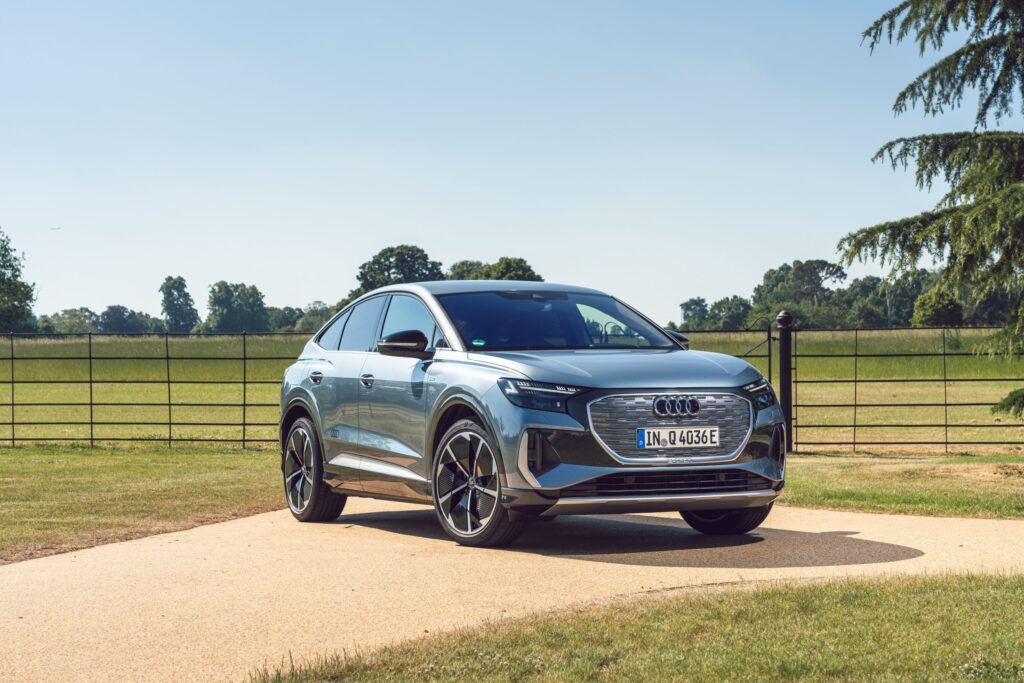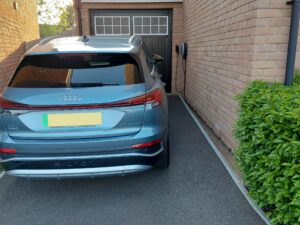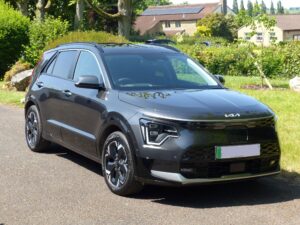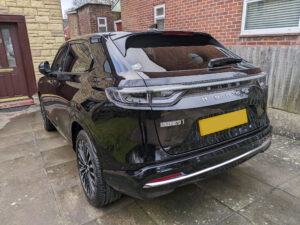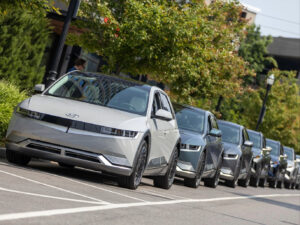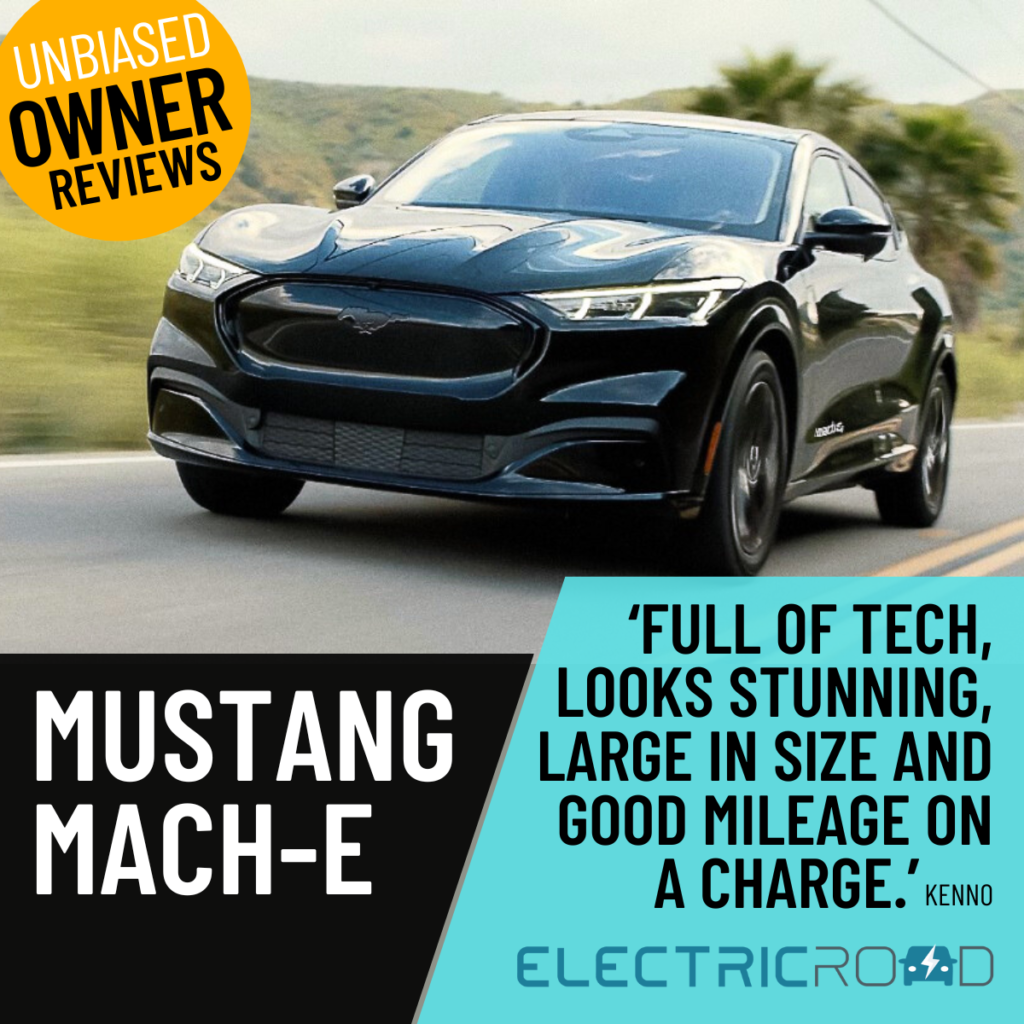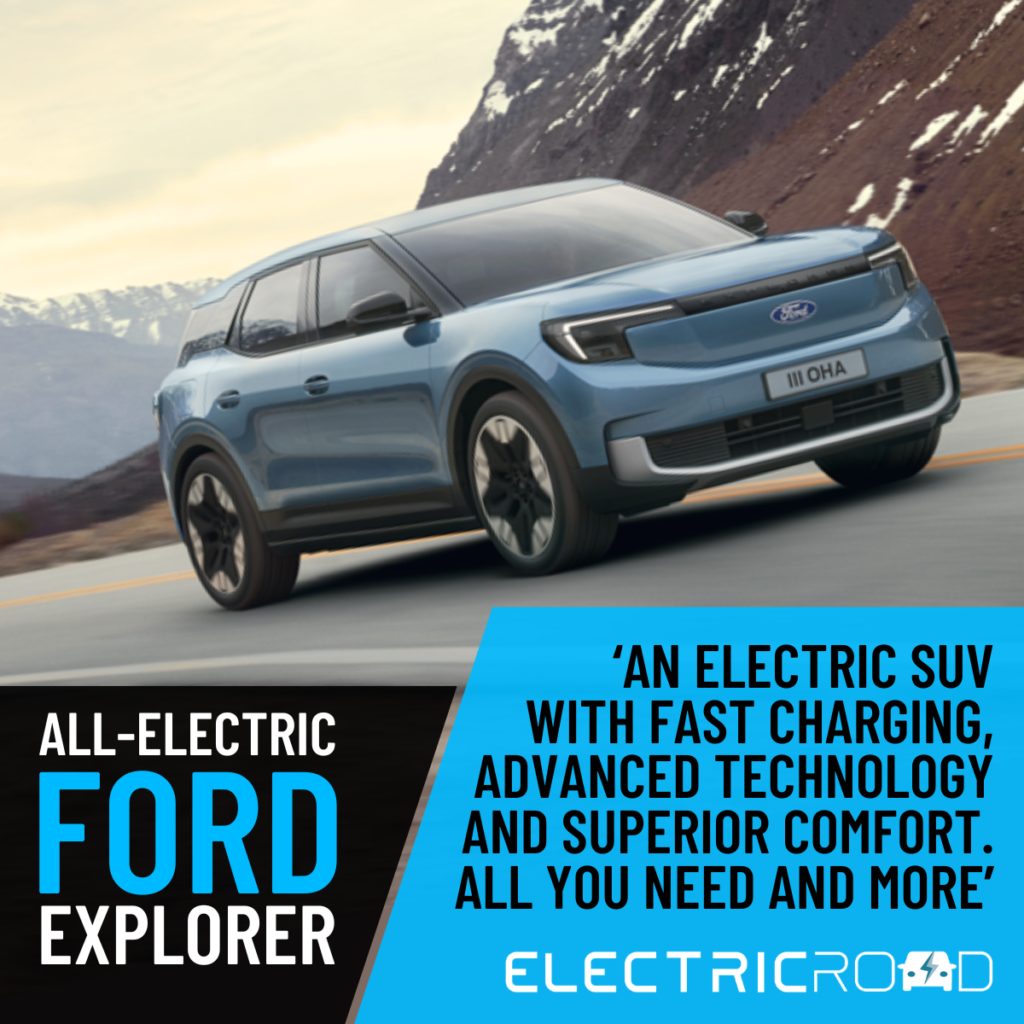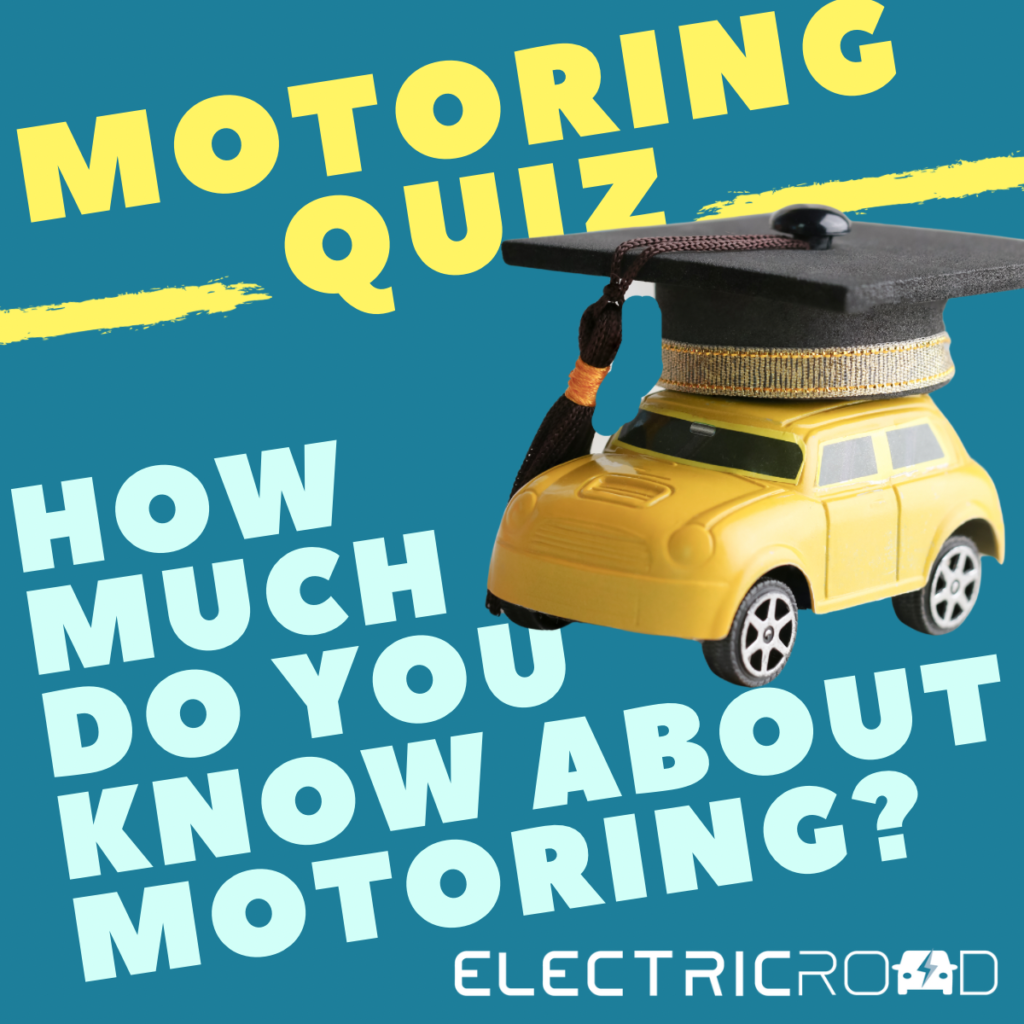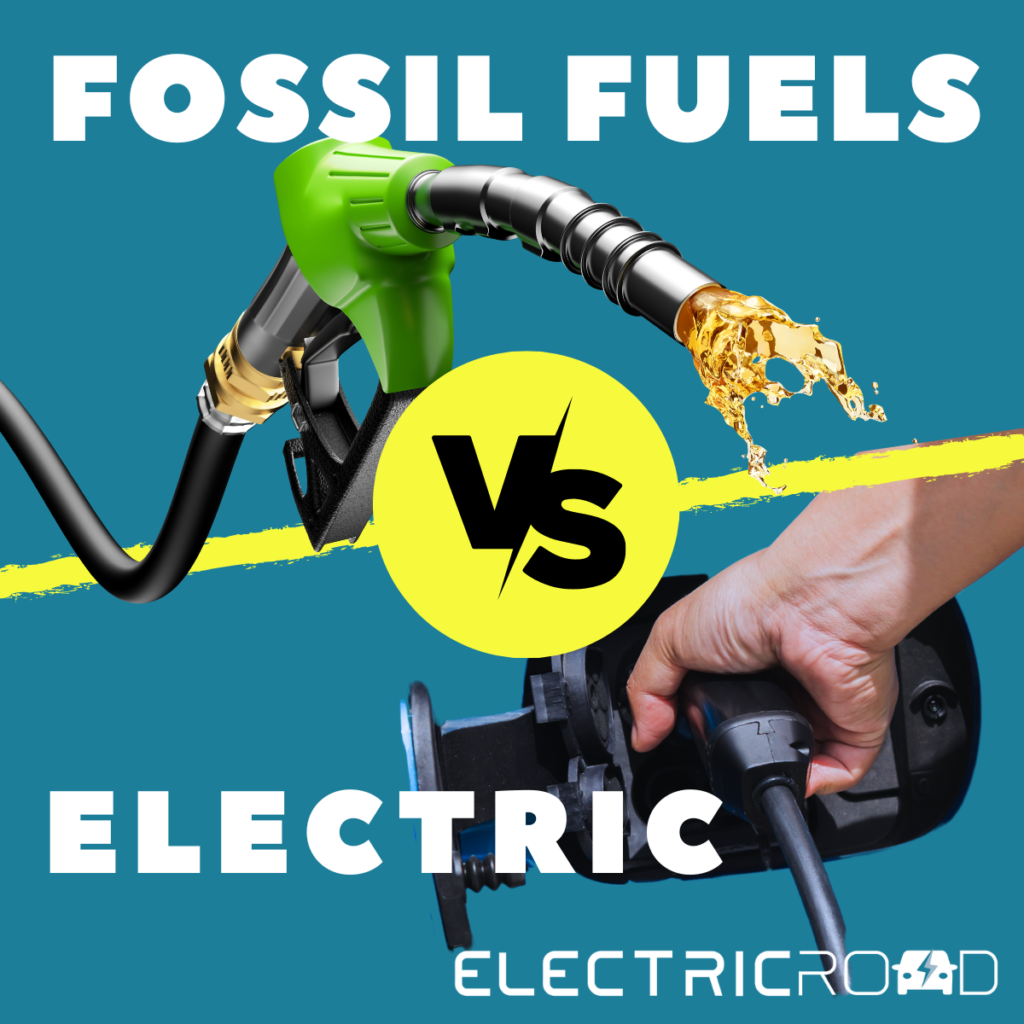The all-new, all-electric Audi Q4 e-tron and Q4 Sportback e-tron are both on sale now, priced from £40,750 OTR and £42,250 OTR respectively. Customer deliveries of the Q4 e-tron are under way, while the first Sportback customers are due to take delivery in October.
Conveying the design of the concept cars into series production with minimal alteration, the all-rounders will be offered in the UK in conjunction with Sport, S line, Edition 1 and Vorsprung trim options and with a choice of two battery variants and three drive configurations capable of WLTP-certified driving ranges of up to 316 miles (Q4 40 e-tron Sport). They will also provide unusually ample space in which to go the distance in a fully digital cabin. Its specification incorporates fittingly ingenious technology, including a pioneering augmented reality head-up display connecting the virtual and real worlds in a totally new way.
“The imminent arrival of the Q4 Sportback e-tron into our showrooms is the next crucial step in our bold electrification plan,” commented Director of Audi UK Andrew Doyle.
“Both the SUV and Sportback variants bring striking Audi design, impressive packaging, and attractive price points to a new segment of the market. Rapid charging capability and over 300 emission-free miles on a single charge will help ensure our transition from ICE to electric power is a smooth one for our customers.”
Get our FREE ‘GUIDE TO THE BEST EVs’ e-mailed directly to your inbox
Audi’s next step: the exterior design
With the Q4 e-tron and the Q4 Sportback e-tron, Audi is introducing the next step in its design language for electric models. Like the 2019 concept cars that they so closely resemble, the new compact SUVs show striking proportions accentuated by their short front overhangs and large wheels emphasised by blisters and by a surface treatment that is clear and pared back but also intersected by high definition lines. In the Audi Q4 Sportback e-tron, the especially low coupé-style roofline ends in a designed rear where the spoiler sits deep on the two-part window.
As is customary for Audi the design gives appropriate priority to functionality and aerodynamics: The Q4 e-tron achieves a drag coefficient of 0.28, and the Sportback gets to an even lower figure, with a drag coefficient of 0.26. A key contributor to these impressive figures is the main section of the bodies, with their glasshouses drawn in sharply towards the rear. The adjustable cooling air inlet in front of the radiator and compressor is another important factor. Supplied by the central lower air inlet, its electric louvre is opened if the major assemblies require cool air, such as when the vehicle is charging but remains closed in the majority of situations to minimise energy losses caused by air flow through the narrow cooling ducts, adding around four miles to the overall driving range. Three-dimensional spoilers in front of the front wheels also optimise the airflow, adding almost nine miles to the range, and a partial covering for the control arms of the rear axle gives another boost of just over two miles.
Detailed solutions, on which the Audi aerodynamics experts have worked closely with the designers, provide further gains in range. At the front, the narrow vertical bars below the headlights channel the airstream smoothly along the vehicle’s side, resulting in a three-mile range uplift and a minute step on the exterior mirror housings known as the turbulator edge allows the airflow to swirl in a targeted way, which is good for another mile. The 19-inch Aero wheels with their flat designs also facilitate low-loss air flow, notching up an additional three miles and even the tailgate seal plays its part. Designed to handle the pressure conditions generated by the roof edge spoiler, it adds just over two more miles to the range.
On the Q4 Sportback e-tron, the spoiler sits much lower on the split and steeply raked rear window and as the area in which the air swirls as it comes off the vehicle is restricted to the zone beneath the spoiler that area is significantly smaller than in the Q4 e-tron. This not only highlights the unique design of the SUV coupé but also enhances its range by around 7 miles while also reducing the lift on the rear.
LED technology with new variable light signatures
LED headlights are of course standard throughout the new Q4 e-tron and Q4 Sportback e-tron ranges. In Edition 1 and Vorsprung versions these include Matrix LED technology, which is also available for Sport and S line models as an optional extra. In the Q4 e-tron models the Matrix LED units with their 16 individually actuated LEDs not only offer enhanced and more precisely targeted illumination but also feature variable digital light signatures that represent a world first for the brand: the driver can switch between four signatures via the MMI touch operating system.
Where Matrix LED lights are installed, a light strip also extends for the full width of the rear, beginning as a fine line in the centre that splits into separate segments at each end. Each individual segment is modelled as a three-dimensional body, resulting in a particularly expressive light sculpture inspired by intricate electric circuits and bearing the Four Rings radiating in signature red as its central detail.
Colours, wheels and distinguishing features
A choice of eight paint finishes can be specified for the new Q4 e-tron and Q4 Sportback e-tron, including the new metallic shade ‘aurora violet’ which has until now been reserved for Audi Sport models. In Sport versions 19-inch Graphite grey alloy wheels with a special ‘aero’ design that contributes to overall efficiency amply fill the wheel arches, which along with the lower section of the bumper and the diffusor are painted in contrasting metallic Manhattan grey. A gloss package also accentuates the side windows, which are privacy tinted at the rear in S line models and above.
In common with all members of the Audi family, S line models also stand out through their exclusive front and rear styling treatment, which here includes additional chrome elements that lend the octagonal Audi Singleframe synonymous with Q models its own distinctive look. Larger 20-inch alloy wheels also work in favour of road presence in S line and Edition 1 models, the latter gaining even more through a full-body paint finish in a choice of four colours and a black styling package that adds dark accents throughout. The black styling package is also a feature of the top-tier Vorsprung models with their even more striking 21-inch wheels.
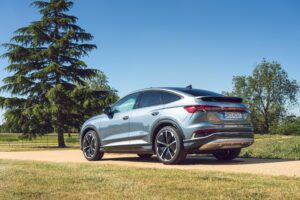
e-mobility for every situation
On the strength of their versatility, the Audi Q4 e-tron and the Q4 Sportback e-tron will integrate easily into everyday life. Within their 4.59-metre footprint they offer a level of space which exceeds existing class standards and is in fact more closely comparable with the full-size SUV class. The spacious feel isn’t confined to the front seats, passengers in the rear also benefit from generous legroom thanks in part to the bespoke architecture of the modular electric drive system (MEB) on which the compact electric SUVs are based, which ensures that a centre tunnel is no longer required. Storage space also abounds, with around 25 litres of capacity available throughout the cabin, including bottle holders integrated in the upper section of the doors that can hold bottles of up to one litre in size safely and within easy reach.
The luggage compartment accessible via the powered tailgate which is standard for all variants also offers more space than is generally found in the compact class and actually bears closer comparison with a midsize SUV: Depending on the positioning of the rear seat backs, the volume of the luggage compartment is 520 to 1,490 litres in the Q4 e-tron and 535 to 1,460 litres in the Sportback.
The compact layout of the drive units, even in the quattro models, has conferred another advantage on the new electric SUVs. It has allowed the developers to move their longitudinal suspension cross-members further towards their centre points, creating space for large wheel arches which in turn enable the wheels to turn more freely. In the variants with rear-wheel drive, the turning circle of the Q4 e-tron and the Q4 Sportback e-tron measures just 10.2 metres. With their ground clearance of approximately 18 centimetres, both models also perform well on rougher terrain.
Quick HPC charging
Quick and easy charging is another strength that ensures daily use of the Q4 e-tron and Q4 Sportback e-tron is as undemanding as possible. Depending on the version, they feature a 52 kWh or 77 kWh battery which can be charged at HPC (high-power charging) stations at a charging capacity of up to 100 or up to 125 kW respectively. At 125 kW, and in ideal conditions, the battery can achieve an 80 percent state of charge from a 5 percent starting point in 38 minutes. WLTP testing has confirmed that the Q4 40 e-tron**, which uses the larger battery, can recharge enough electricity, again in ideal conditions, to cover a distance of about 80 miles (WLTP) in around ten minutes and can achieve a range of up to 316 miles.
Using the myAudi app, owners can activate charging remotely using a smartphone. The app also provides access to the comfort remote preconditioning system, which enables remote adjustment of the cabin temperature and seat heating functions to ensure that the cabin climate is always comfortable well before a journey begins.
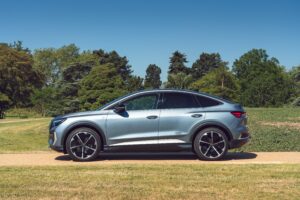
Electric motors and electric all-wheel-drive
At the entry-level, the Q4 35 e-tron and the Q4 Sportback 35 e-tron use the compact battery with its net energy content of 52 kWh (55 kWh gross*), and combine this with an electric motor offering an output of 125 kW (170 PS) and torque of 310 Nm. In both body variants, this is sufficient for 9.0-second 0-62mph acceleration, a governed 99mph top speed and a WLTP-certified range of up to 208 miles on a full charge in the SUV (Sportback range data to be confirmed).
Range of up to 316 miles: the Q4 40 e-tron
The Audi Q4 40 e-tron is equipped with the larger battery, which stores a net 77 kWh of energy (82 kWh gross*). The electric motor generates 150 kW (204 PS) and 310 Nm here, reducing the 0-62mph sprint time to 8.5 seconds in the run up to a top speed that is also governed at 99mph. One charge is enough for up to 316 miles of range in the SUV (Sportback range data to be confirmed).
Top of the range with two electric motors: the Q4 50 e-tron quattro
At the top of the range from a drivetrain perspective, the Q4 50 e-tron quattro and Q4 Sportback 50 e-tron quattro also use the 77 kWh battery (82 kWh gross*), and here it supplies an electric motor on each axle that contributes to a maximum output of 220 kW (299 PS) and 460 Nm (339.3 lb-ft) of torque, while also delivering the advantages of all-wheel-drive.
The rear motor generates 150 kW (204 PS) and 310 Nm and the front 80 kW (109 PS) and 162 Nm. In the interest of efficiency, the motor on the front axle is engaged only when high power or maximum traction are needed, in which case it is activated in just a few hundredths of a second and in many cases predictively even before the car begins to noticeably understeer or oversteer. Both motors keep reserves available for certain driving situations and as a result the sum of their individual outputs exceeds the drive system’s quoted total.
Both model variants tackle the 0-62mph increment in 6.2 seconds and continue to a top speed of 111mph. Driving ranges of circa 295 miles are expected for UK versions of both models subject to confirmation following WLTP testing.
For maximum efficiency: coast or recuperate?
When the Audi Q4 e-tron is on the move in gear D (drive) and the driver releases the accelerator pedal, the drive system switches to coasting mode. Both electric motors, or the rear motor in the rear-wheel drive models, run freely and largely without energy. Coasting takes priority, because it is the most efficient, but if the driver prefers recuperation they can switch to gear B (brake), in which recuperation is almost always prioritised when coasting. If ‘dynamic’ mode is set in the standard Audi drive select dynamic handling system, recuperation also takes place in gear D but at a slightly reduced rate.
The shift paddles mounted on the steering wheel in Edition 1 and Vorsprung versions and optionally available for all others enable the driver to select three different manual recuperation levels in position D. Aternatively, automatic recuperation is configurable via the MMI system.
When braking, the rear electric motor performs the deceleration alone in the majority of everyday driving situations. The quattro models can brake electrically at up to almost 0.3 g, equivalent to a recuperation performance of up to 145 kW. The electric brake booster only activates the hydraulic wheel brakes as well if greater deceleration is required. The transition is almost unnoticeable and recuperation remains active almost until the vehicle is at a standstill. The quattro models prioritise recuperation on the rear axle but also use the front electric motor in certain situations.
Stable temperature conditions
State-of-the-art thermal management based around two cooling circuits also ensures energy is used to best effect in the compact electric SUVs. The thermal management system aims to get the battery up to the ideal temperature range of around 30 degrees Celsius quickly after it is started and to keep it there until the end of the journey. This ensures that its full power, and therefore the power of the entire drive system, is available after a short time even in extremely cold conditions. Thanks to the stable thermal conditions, the driver can also call on it repeatedly or charge the battery at an HPC charging terminal with high output.
Even more efficiency
For even more stringent energy management a highly efficient heat pump is also available as an option for all versions of the Q4 e-tron and the Q4 Sportback e-tron. It rapidly heats and cools the interior using the thermal losses from the electric components and the temperature of the outside air. It uses eco-friendly CO2 as a refrigerant, which flows through the circuit at high pressure. The heat pump can reduce losses in range caused by usage of the climate control system, especially in winter. Its strengths come to the fore on long drives.
The suspension
The high-voltage batteries are located between the axles beneath the passenger compartment, at the lowest point of the car, which ensures a low centre of gravity and a near 50:50 weight distribution ratio, favouring handling. The control systems for the drive system and suspension work closely together to ensure that driving is safe, enjoyable and comfortable at all times.
The front axle of the compact electric SUVs features a classic MacPherson strut layout and is complemented by a compact five-link design reminiscent of the larger Audi models at the rear. As with the front axle, this is mounted on a subframe and optimised through the use of lightweight aluminium for a number of key components.
Mounted behind the large 19-inch to 21-inch wheels are powerful brakes with disc diameters of between 330 and 358 millimetres depending on motor output and these work with extra-low-wear, low-maintenance drum brakes at the rear. The drums reduce the risk of corrosion, because in a purely electric drivetrain the wheel brakes are used less frequently in everyday driving, most deceleration is performed by the electric motor in the rear, which converts kinetic energy to electrical energy in the process.
Sport settings and damper control
S line and Edition 1 versions of the Q4 e-tron and Q4 Sportback e-tron are equipped as standard with a sport suspension featuring particularly driver-focused spring and damper settings that also lower the body by 15 millimetres.
Along with the entry level Sport model, these versions are also available with a suspension system with damper control. Included as part of the standard Vorsprung specification, its control unit manages the characteristics of the dampers in line with the driving situation at five-millisecond intervals by regulating the oil flow, ensuring that they are always primed for optimal performance in fast-changing road and driving conditions.
The electronic dynamic handling system managing the adaptive dampers also controls the brake interventions of the wheel-selective torque control, where it works closely together with the ESC stabilisation system. This aims to harmonise the actual behaviour of the car with a digital target model so that the transverse dynamics and driving safety are always at the optimum level.
The ESC is also closely networked with the control units for the electric motor and its power electronics and by issuing control signals every millisecond performs particularly effectively even in the rear-wheel drive models, which would have a tendency in principle to oversteer. It ensures that the Q4 e-tron grips securely in every situation. The driver can also set the ESC to sport mode and deactivate the traction control at the flick of a switch.
Audi drive select with range mode and progressive steering as standard
Variable ratio progressive steering enhances response in all UK versions of the Q4 e-tron and Q4 Sportback e-tron. Its operating characteristics, along with those of the suspension with damper control, the electric motors and the electric all-wheel drive system (in quattro models) can be fine-tuned via the standard Audi drive select dynamic handling system. Using MMI Touch the driver can choose between the familiar Audi modes of: Comfort, Auto, Efficiency, Individual and Dynamic, plus an additional ‘Range’ mode, in which the car prioritises energy efficiency and maximum speed is limited to either 55mph or to 80mph in ‘Efficiency’ mode.
The interior and operation
The interiors of the Audi Q4 e-tron and Q4 Sportback e-tron are characterised by a real sense of space and are centred around the instrument panel. This is oriented towards the driver and divided into separate areas integrating two displays, the central MMI touch monitor, with acoustic feedback and natural language voice control and the Audi virtual cockpit. Both of these feature as standard throughout the UK range. An upgraded Audi virtual cockpit plus is installed in Vorsprung versions and available for all others as part of the optional Technology Pack. It adds an ‘e-tron’ layout to the standard system’s selectable ‘Classic’ and ‘Sport’ screen formats in which the power meter is brought to the fore. A larger 11.6-inch version of the MMI touch screen notable as the largest display in the Audi portfolio to date will also become available later this year.
As usual in the Audi range, infotainment and navigation are operated primarily using the central MMI touch display. This system also grants access to the apps available via the standard Audi smartphone interface, now offering wireless connection for some handsets. In the UK MMI Navigation Plus and Audi connect internet connectivity feature as standard across the board, as does the e-tron route planner, which works with them to calculate the optimal route that tracks the public charging infrastructure as closely as possible. Through Audi connect the Q4 e-tron and Q4 Sportback e-tron can also display high-resolution satellite images from Google Earth for navigation, deliver accurate traffic information derived from the swarm intelligence of the Audi fleet and offer useful features such as a news feed, weather and travel updates and an on-street parking assistant.
New augmented reality head-up display
For the first time, augmented reality also takes pride of place in the technology arsenal of a series production Audi model in the new Q4 e-tron. The new augmented reality head-up display forms part of the standard specification for Vorsprung versions and is a key component of the optional Technology Pack available for all other variants.
This major advance in display technology projects important information onto the windscreen on two separate levels, a status section and an augmented reality (AR) section. Key information and symbols from specific assistance systems and from the navigation module are visually superimposed on the ‘real life’ area to which they specifically relate as content of the AR section and displayed dynamically. They appear to be floating virtually at a physical distance of roughly ten metres from the driver, and depending on the situation can even appear considerably further ahead in some cases. The driver can understand the displays very quickly without being confused or distracted by them, and they are extremely helpful in poor visibility conditions.
Steering wheels with touch operation
The new generation of double-spoke steering wheels with touch-sensitive control in the Audi Q4 e-tron and Q4 Sportback e-tron also breaks new ground for the brand. The upper spokes of the wheels feature touch surfaces in a black-panel look, where the functional areas are also backlit to indicate the active buttons. Slight protrusions separate them from each other, making them easier to use, while the buttons provide feedback that is soft to the touch when pressed. Just as on a smartphone, there are not only touch gestures but also swipe gestures, for example for scrolling through lists. The steering wheels are available in different versions, the most striking of which is fitted to Edition 1 and Vorsprung versions and features a flattened top and bottom, two-part trim on the spokes and paddles for coasting recuperation. It is also available as an option for Sport and S line models.
Sonos as a new audio partner
Also new to the Q4 e-tron and Q4 Sportback e-tron is a premium sound system supplied by Sonos, the world’s leading sound experience company and a new and exclusive Audi partner. Fitted as standard to Vorsprung versions and available for all others as part of the optional Comfort and Sound pack, the system is incorporated into the Audi soundCube, a fully integrated and easily adaptable software environment.
In the Sonos system on board the Q4 e-tron and Q4 Sportback e-tron, the Sonamic Panorama algorithm, which was developed by the Fraunhofer Institute, distributes signals to ten loudspeakers. It uses stereo recordings to generate a three-dimensional surround sound, where it places the individual sound sources on a virtual U-shaped sound stage. This gives the listener the impression they are sitting in the middle of the orchestra or band. The four tweeters and centre speaker are driven by an amplifier that is integrated in the car’s MIB 3 digital architecture. A separate eight-channel booster is responsible for the four bass loudspeakers and the subwoofer in the luggage compartment. Together, the two amplifiers offer an output of 580 watts.
The front seats
The front seats in the Q4 e-tron models represent the state of the art in safety technology. In the event of a side impact, a centre airbag deploys from the left-hand bolster of the driver’s seat in addition to the side airbags to ensure that the driver and front passenger do not collide with one another. In the UK, all models feature a sport version of the seat with visually integrated head restraints.
Dinamica and Pulse: seat upholstery made with recycled polyester
Among the many high quality materials and finishes available either as standard or optionally for the Q4 e-tron are upholstery choices in either premium fine Nappa leather or combinations of leather and artificial leather or artificial leather and the microfibre material Dinamica. This looks and feels like suede but is made of 45 percent recycled polyester from various sources, including textiles and PET bottles. Some upholstery options form part of interior packages that also include additional upgrades to décor, lighting and functionality.
The S line interior has a particular sustainability focus. Like the optional Dinamica material, its standard Pulse cloth upholstery, which is combined with artificial leather, is produced using secondary raw materials, including repurposed PET bottles. Up to 50 percent of the textile used for the Pulse material is derived from the bottles, which are transformed into yarn in an elaborate procedure that yields the same quality standards in terms of look and feel as conventional textile upholstery. A new lease of life is given to 26 1.5-litre plastic bottles to create a set of seats with this upholstery for the Q4 e-tron.
More familiarly, the S line cabin is also marked out by illuminated aluminium ‘S’ door sill trims, pedals with stainless steel supports, a black headlining, S embossing for the seat backrests, a perforated leather-bound steering wheel with contrasting stitching and S badging. These details also enhance the interiors of Edition 1 and Vorsprung models, the latter also bringing on board additional comforts such as fine Nappa leather upholstery, a panoramic glass sunroof, Audi Phonebox wireless handset connectivity and charging and the Sonos audio upgrade.
Safety first: extensive range of driver assist systems
Everyday driving in the compact electric SUVs is facilitated and delivered as economically as possible, by a number of standard assistance systems. These include predictive efficiency assist, which supports a forward-looking driving style that optimises the consumption of energy, Audi Pre-sense front with pedestrian and cyclist detection, lane departure warning and swerve and turn assist. Further optional systems, like many other equipment features, are divided into packages. Highlights of the Assistance Package Pro include adaptive cruise assist, which assists the driver with longitudinal and lateral guidance over the entire speed range and a four-camera system providing 360° visibility that makes lighter work of city driving and parking. The Safety Package Plus adds features such as Audi Side Assist blindspot monitoring and the rear cross traffic assist reversing aid. Both packages are standard features of Q4 e-tron and Q4 Sportback e-tron Vorsprung models.
Sustainability in the spotlight: with a CO2-neutral footprint
Avoid, minimise, or offset unavoidable emissions: Audi produces the Q4 e-tron and the Q4 Sportback e-tron with a neutral carbon footprint at the Zwickau plant using eco-electricity, while the battery cell suppliers are also required to use only green electricity in their production processes. Emissions that cannot currently be avoided are offset by climate protection projects certified by the German technical inspection association or TÜV. They meet the strict requirements of the Gold Standard Foundation.
Together with its suppliers, Audi is firmly and systematically committed to acting responsibly in all vehicle projects. Since 2017, the company has been reviewing its partners using a sustainability rating developed in-house to ensure resource-saving production processes and adherence to social standards.
*Note: Battery sizes are quoted in net and gross. The gross figure refers to the total amount of battery capacity physically in the car, while the net figure is the total capacity that is limited by the installed software to protect and increase battery life.


